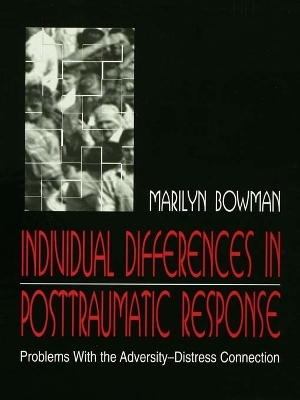
individual Differences in Posttraumatic Response
Routledge (Verlag)
978-0-8058-2713-2 (ISBN)
This book challenges the assumptions of the event-dominated DSM model of posttraumatic stress disorder. Bowmam examines a series of questions directed at the current mental health model, reviewing the empirical literature. She finds that the dose-response assumptions are not supported; the severity of events is not reliable associated with PTSD, but is more reliably associated with important pre-event risk factors. She reviews evidence showing the greater role of individual differences including trait negative affectivity, belief systems, and other risk factors, in comparison with event characteristics, in predicting the disorder. The implications for treatment are significant, as treatment protocols reflect the DSM assertion that event exposure is the cause of the disorder, implying it should be the focus of treatment. Bowman also suggests that an event focus in diagnosis anad treatment risks increases the disorder because it does not provide sufficient attention to important pre-exisiting risk factors.
Marilyn L. Bowman
Contents: Preface. Is There a Problem in Understanding Post-Event Distress? How Prevalent Are Toxic Events and Event-Attributed Clinical Distress Disorders? Do More Terrible Events Lead to More Serious Disorders? What Are Typical Responses to Direct Exposure to Toxic Life Events? What Are the Effects of Indirect Toxic Exposures? How Much Do Individual Differences in Pre-Event Competencies Affect Responses to a Toxic Event? How Powerful Are Individual Differences in Emotionality? Do Beliefs Affect Individual Reactions to Toxic Events? Do Groups Differ in Post-Event Reactions? Which Has More Power in Determining Distress, the Event or the Person? Why Are Clinicians Reluctant to Look for Causes Beyond the Event? How Important Are Emotions as a Guide to Well-Being? Can Professional Treatments Remedy Event-Attributed Distress? Conclusion and Implications.
| Erscheint lt. Verlag | 12.8.1997 |
|---|---|
| Verlagsort | New York |
| Sprache | englisch |
| Maße | 152 x 229 mm |
| Gewicht | 530 g |
| Themenwelt | Geisteswissenschaften ► Psychologie ► Psychoanalyse / Tiefenpsychologie |
| Geisteswissenschaften ► Psychologie ► Verhaltenstherapie | |
| Medizin / Pharmazie ► Medizinische Fachgebiete ► Neurologie | |
| Medizin / Pharmazie ► Medizinische Fachgebiete ► Notfallmedizin | |
| ISBN-10 | 0-8058-2713-7 / 0805827137 |
| ISBN-13 | 978-0-8058-2713-2 / 9780805827132 |
| Zustand | Neuware |
| Haben Sie eine Frage zum Produkt? |
aus dem Bereich


